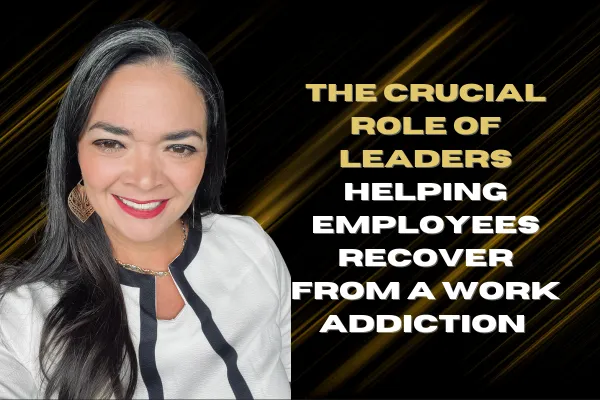Harness the Power of Exceptional Leadership

The Crucial Role of Leaders helping employees recover from a Work Addiction
“Leaders who actively promote and practice work-life balance contribute to a healthier, more productive workplace. By supporting employees in their journey to balance, companies can see a reduction in burnout rates, higher employee satisfaction, and, ultimately, a more committed and motivated workforce.” - Carmen Paredes
In today's high-speed business environment, work addiction is an all-too-common challenge, often masked by the guise of dedication and high performance. However, as we emerge with a deeper understanding of the importance of mental health, it is vital to address the aftermath of such challenges, particularly work addiction. Leaders play an indispensable role in this recovery process, guiding their teams toward sustainable work-life balance.

Understanding Work Addiction
Work addiction, or 'workaholism', is characterized by an uncontrollable need to work as a coping or numbing mechanism. This compulsive behavior often stems from deep-rooted psychological issues such as the need for approval, fear of inadequacy, or the desire to escape emotional stress. The recovery from such a state is not just about working less, but about cultivating a healthy, balanced approach to work.
The Leader's Role
As leaders, the responsibility extends beyond mere project management and target achievements; it involves fostering a supportive environment that promotes well-being.
Here's how leaders can support their employees in achieving work-life balance post-recovery:
1. Modeling Healthy Behaviors
Leaders should set an example by maintaining balanced work habits themselves. This includes setting clear boundaries between work and personal life, taking regular breaks, and advocating for mental health days. When leaders practice what they preach, it encourages employees to follow suit.
Do you feel you are modeling the correct behaviors for your team members?
2. Creating an Open Environment
Encourage open discussions about mental health and work-life balance in the workplace. This can be done through regular check-ins and by providing a platform where employees feel safe to express concerns related to work stress or addiction.
Are you all work, work, work... or are you promoting a safe space for employees to ask for help if needed?
3. Offering Flexible Work Arrangements
Flexibility can be a tremendous aid in maintaining work-life balance. Offering options such as remote work, flexible hours, or a results-oriented work environment allows employees recovering from work addiction to ease back into a productive routine without overwhelming themselves. It also helps those employees on the brink of, not to get there.
Do you believe in the old school philosophy "butts on seats" or are you adapting the flexible work wave yourself?
4. Providing Access to Professional Help
Sometimes, professional intervention may be necessary to help employees deal with work addiction. Leaders can facilitate this by providing access to counseling services or employee assistance programs that specialize in such issues.
Did you know that with a coaching certification accredited through the National Board of Certified Counselors and as a recovering workaholic myself I help organizations and leaders address this very issue, costing so many resources in organizations today?
Schedule your free consultation today with this link.
5. Recognizing and Rewarding Balanced Success
Shift the focus from glorifying overwork to rewarding efficiency and balance in achievements. Recognize employees who accomplish their tasks within normal working hours, who innovate to improve processes, and who contribute positively to the team environment without sacrificing their well-being.
Imagine the day when those who are effective get rewarded more than those that have to work longer hours to get the same things done...
The Impact
Leaders who actively promote and practice work-life balance contribute to a healthier, more productive workplace. By supporting employees in their journey to balance, companies can see a reduction in burnout rates, higher employee satisfaction, and, ultimately, a more committed and motivated workforce.
Here is the important stuff: As we navigate the complexities of modern work cultures, the role of a leader is not just to lead in business but to lead in promoting the holistic well-being of their teams. The journey to recovery from work addiction is a pivotal opportunity to reset the norms and culture within a team, emphasizing that true dedication to work includes taking care of one's health and well-being.


